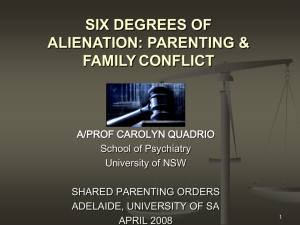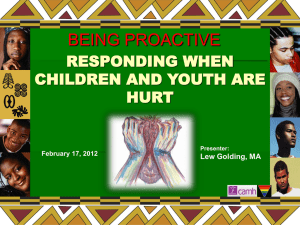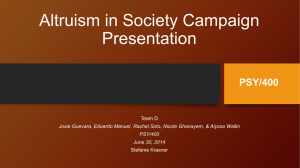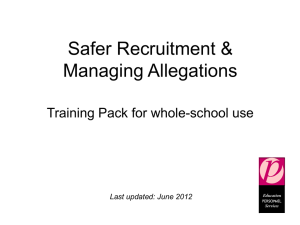psychological assessments for custody conflicts
advertisement
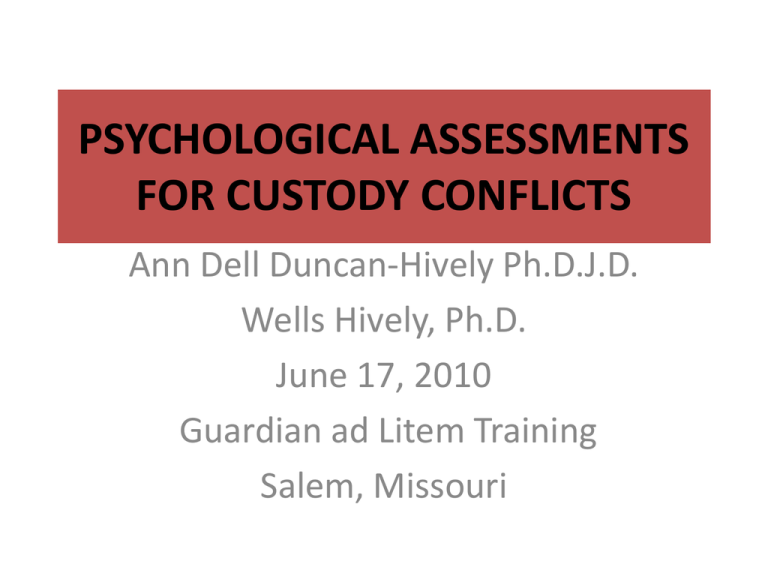
PSYCHOLOGICAL ASSESSMENTS FOR CUSTODY CONFLICTS Ann Dell Duncan-Hively Ph.D.J.D. Wells Hively, Ph.D. June 17, 2010 Guardian ad Litem Training Salem, Missouri The guardian ad litem as a mental health detective • Responsibility to understand the needs of the children • Legal duty to zealously represent interests of children • Present accurate information to the Court as other attorneys are advocating their client • Distinguish between temporary conditions for family in conflict versus long term dysfunction What?, Why? Who Should Do It?, When? •Systematic, objective description of psychological functioning of parents/children •To assist in decision making prior to conversation with other attorneys •Must use an expert who meets the Daubert standards •As early in the case as possible in order to facilitate PDL and/or settlement. •Need Court order and payment clarification How Severe is the Conflict? It’s difficult to separate endemic from transitory rage Reasons to Need a Custody or Psychological Evaluation • • • • • • • Allegations of abuse to children Allegations of domestic violence History of poor conflict resolution skills Legal history of drugs, alcohol, assaults Alienation by one or both parents Poisoning by grandparents or others Unusual behaviors in child or children UNUSUAL BEHAVIORS • Below age six – – – – – Rocking Smearing feces Loss of toilet skills Chronic constipation Attacking other children with objects – Refusal to take turns or cooperate • Between six and twelve – – – – – Chronic isolation Fierce tantrums Speech dysfluencies Difficulty keeping friends Rapid movements from one activity to another – Learning challenges – Hording objects and food UNUSUAL BEHAVIORS • Between ages 12 and 18 – Cutting and other self injury – Delayed social development – Threats of self harm or harm to others – Violence to animals or small children – Bullying in home or in school – Social alienation – Gender confusion Unusual Allegations • Parental Alienation “Syndrome” – Not an actual syndrome but present in various amounts in most divorces – Dealing with death of marriage by monsterizing the other parent – Can be subtle or overt – Purpose is to destroy relationship with other parent and “own” the children – See Grisso, T. Evaluating competencies: Forensic assessments and instruments (2nd), New York, Kluwer/Plenum, 2003 Parental Alienation See Meier, J. Parental Alienation Syndrome & Parental Alienation: Research Reviews 2009 http://www.new.vawnet.org Unusual Allegations • Sexual Abuse • If arises during pendency of divorce, all cases must be evaluated –False or accurate? Depends on: • Age of complainant • Role of parent in disclosure • History of abuse in both parents • Beware of contaminating therapists and suggestive social services Abuse allegations Related to domestic violence, physical , emotional or sexual abuse of children Always assess if allegations of abuse Risk assessment Custody Evaluation Looks at Best Interest of Children Assessment of Parents Only Reflects Competency Who Does A Psychological Assessment? • • • • • Licensed psychologists in Missouri Trained in forensic assessments History of good quality assessments Capable of communicating without bias Counselors licensed as LPC cannot diagnose and cannot interpret psychological tests • Social workers (LCSW) can diagnose but cannot interpret psychological tests • See new rule 20 CSR 2235-1.015 (12) limits administration and interpretation of psychological tests to licensed psychologists Components of the Psychological Evaluation • Histories of all – Family, forensic and sexual, medical (especially head trauma) • Cognitive Abilities – How each person thinks, flaws in language competency • Present Emotional States – Anxiety, depression, thoughts of suicide, etc • Personality Structures – How they typically deal with the world • Substance Abuse – It’s impact, if any, on all of the above, age of onset, types used • Current Other Relationships • Risk of Family Abuse • Parenting Interests and Abilities Format for the DSM-IV Diagnosis • • • • • Axis I: Major mental illness Axis II: Personality Disorders Axis III: Physical contributors Axis IV: Environmental Factors Axis V: Global Assessment of Functioning (range from 10 to 90, most commonly at 65 for mental health population) • (Diagnostic and Statistical Manual of Mental Disorders 4th Edition) www.dsmivtr.org Basics of Psychological Measurement Think Daubert Standard (Fed. R. Evd. 702) scientifically reliable and relevant Replicable Results Don’t fluctuate wildly and mysteriously Psychologists say “reliable” Correlate with important variables Psychologists say “valid” Attorneys say “meet the Daubert Standard” Respected Structured Interviews and Questionnaires • Early Developmental Family History Various schools, child development centers and counseling services all use these. They are very similar. • Forensic History and Parenting History Greenberg Forensic/Parenting History Questionnaire Developed by S.A. Greenberg, U. of Washington (now deceased) unpublished, but available from www.duncanhively.com • Sexual History Clark Sexual History Questionnaire, Revised (SHQ-R) www.mhs.com Abel Assessment, written section http://abelscreening.com Respected, Quick and Painless Wechsler Abbreviated Scale of Intelligence (WASI) Kaufman Brief Intelligence Test, 2nd Ed. (K-BIT) Both available from www.pearsonassessments.com The Respected Personality Tests Minnesota Multiphasic Personality Inventory, 2nd Edition (MMPI-2) www.pearsonassessments.com Caldwell Scoring www.caldwellreport.com Millon Clinical Multiaxial Inventory, 3rd Edition (MCMI-III) www.pearsonassessments.com The “Famous” Rorschach Test Rorschach Comprehensive System Rorschach Interpretive Assistance Program (RIAP 5) www.rorschachworkshops.com www.rorschachtraining.com Psychopathy/Sociopathy The Hare Psychopathy Checklist www.hare.org Risk of Violence Macarthur Study (2001) www.macarthur.virginia.edu/risk.html Level of Service Inventory (LSI-R) www.assessments.com Spousal Assault Risk Assessment Guide (SARA) www.mhs.com Danger Assessment (prediction of murder) www.dangerassessment.org Best Interest Standard • Requires observing children with both parents separately • May require a home visit to both homes • Find collateral information such as school records, pediatrician records, interview all grandparents • Tests appropriately geared to children’s age and developmental status • Report integrates multiple information sources without invading province of court Competency of Parents • Common tests – MMPI-2 with parenting norms – Rorschach – PSI: parenting stress inventory • Common Questions – What level of risk for which parent – Predicting similar parenting behaviors – Length of marriage and success of mutual problem solving After the Assessment • Red Flag Diagnostic Codes for Parenting – Borderline Personality Disorder – Socio or psychopathy – Narcissism – Primitive Personality Structure – Impulse control problems and rage reactions – Bi-Polar (untreated) – Active, chronic drug abuse and/or alcoholism After continued • Children can endure and live with –Moderately impaired schizophrenics –Obsessive compulsive disorder –Anxiety disorders –Dysthemia –Thought Disorder (mild) –Aspergers Helpful References • Guidelines for Child Custody Evaluations in Family Law Proceedings. http://www.apa.org/practice/guidelines/childcustodyt.pdf • Ellis, Elizabeth Divorce wars: Intervention with families in conflict. Washington D.C.,APA, 2000 • Melton, G. et al. Psychological evaluations for the courts: A handbook for mental health professionals and lawyers (3rd), New York, Guilford Press, 2007 TRY IT YOU MIGHT FIND IT HELPFUL
